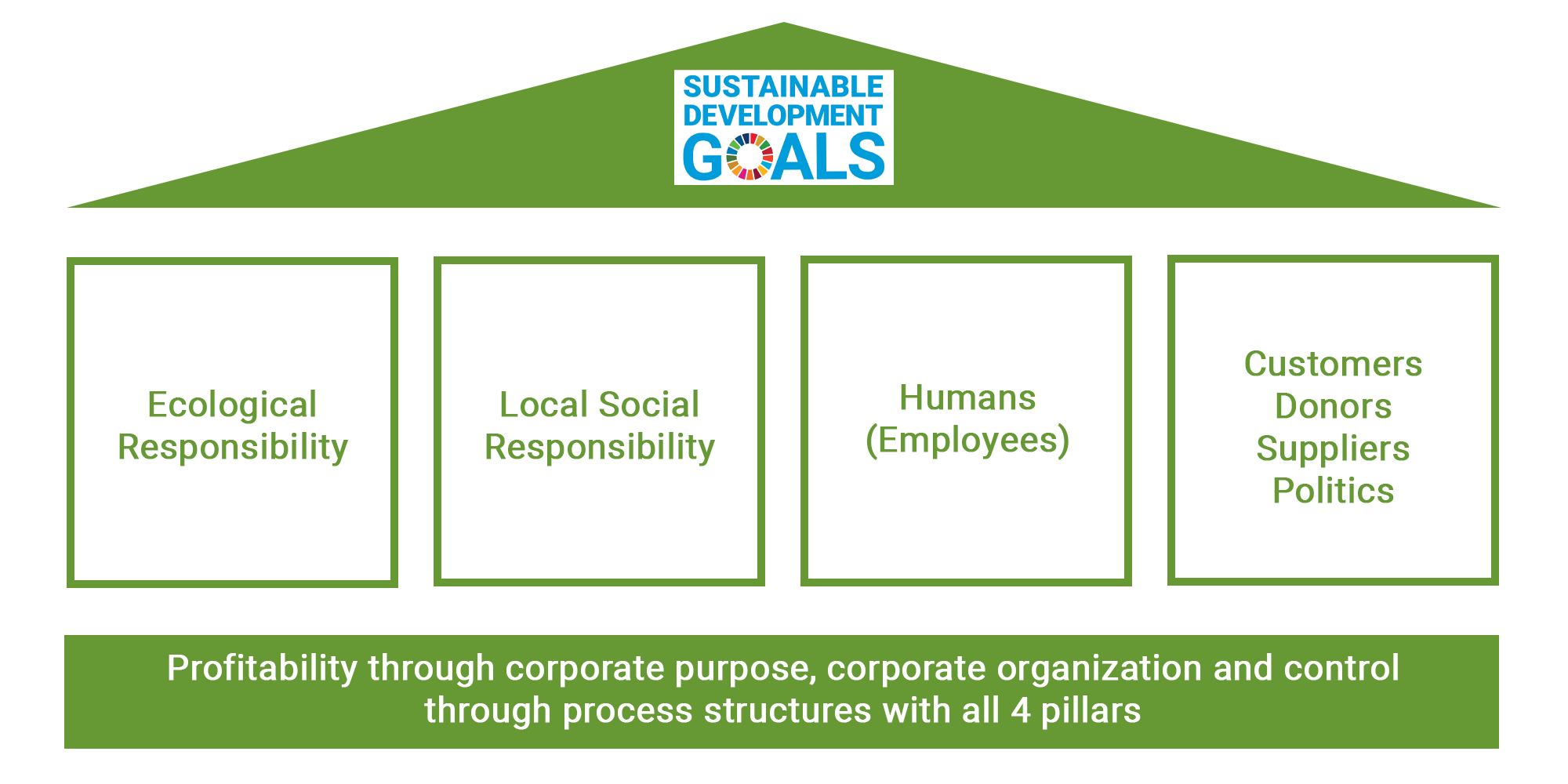360° ESG Management Consultancy through Sustainability Strategy and Implementation
Why is being for the future important for the employer brand and as a strategic direction?
Many companies are facing major challenges due to current technical and economic developments such as digitization, automation or globalization. They are looking for a sustainable concept with which they can realign their company and achieve long-term profit, social and ecological goals.
Resource-efficient and sustainable design of your organization increases profitability, productivity and transparency. In addition, the focus here is on people: Creating meaning / purpose and intensive real relationships strengthen the loyalty of your employees and customers through the trust and innovation of your employer brand.
This is where my modular offer comes in: together we will find the right path to appropriate and sustainable company goals. With the help of offers such as reporting, impact / materiality analysis, sustainability matrix, as well as a future-proof and resilient supply chain and motivated, committed and loyal employees, we achieve an innovative corporate culture.
In addition, I support you with the implementation of the B-Corp certification in Austria. The Benefits Corporations is a non-profit organization that issues certifications worldwide for particularly outstanding companies with proven social and ecological commitment, such as Patagonia, Innocent, Ben & Jerrys or Chiesi Group. Together we will work out a plan so that you too can become part of the B-Corp network now!
The whole is more than the sum of its parts: various comprehensive measures lead to successful, resilient sustainability with purpose. With this "TBS model" you too can secure your long-term competitive advantage!
TBS-Model towards sustainability as your company culture

The TBS model for sustainability is based on the following pillars of the sustainable development goals (UN Sustainable Development Goals 2030, SDGs for short - www.sdgs.un.org) of the United Nations: ecological responsibility / local social responsibility / people / Customers, donors, suppliers, politics. These four pillars form the foundation for a sustainable corporate purpose or long-term corporate organization, as well as control through process structures. Methods such as workshops, keynotes, co-creation and analyzes are used for strategic alignment and support.
The B Corporation certification makes this model measurable by means of the so-called “B Impact Assessment” (BIA for short). You can find more information on this on the website www.bcorporation.net. This builds on your own materiality analysis / matrix. The materiality matrix is used to specify the sustainability topics that are relevant for all stakeholders in order to arrive at a meaningful sustainability strategy and report.
Ecological Responsibility through:
- Mobility concepts: How do you sustainably reduce your CO2 footprint? Getting to know other options than diesel or gasoline company cars, and much more
- Energy efficiency: Establishing current consumption and possibilities for improvements from a cost and environmental perspective, recycling concepts: what happens to your waste? How can you get rid of waste and is your responsibility limited to the company?
- Green purchasing / Green procurement: what is a green office and what are green meetings? Do these concepts go beyond recycled copy paper? What does purchasing have to do with it? How do you buy office supplies, catering, cleaning supplies, electricity, etc. in a more environmentally friendly way?
- source efficiency and circular economy in focus: How far does your responsibility go in terms of resource usage? How can you support your suppliers and customers in this respect?

How do you take on local social responsibility?
- Corporate Social Responsibility (CSR): Sustainability through internal and external communication, ensuring your measures and goals
- Identity through your brand
- Targeted support for projects through associations and voluntary employee participation that strengthen your strategy
- Voluntary engagement and use of supply chain contacts and stakeholders who are thematically related to one's own company in order to work together on important social or ecological issues; Regional partnerships: How can you use your existing network to reduce your ecological footprint more efficiently or to jointly address social problems that affect us directly and that we can change?
People Management / Humans into Focus
- Internal team development measures strengthen employee engagement
- Using the right employees at the right job increases loyalty and productivity / personal and personnel development
- Management training courses on leadership styles that combine the common purpose of economic gain with social and ecological responsibility
Develop Relationships with Customers, Donors, Suppliers, Politicians
- Innovation workshops through co-creation of all stakeholders and departments to enable new, different ways of thinking: When was the last time you took a very young employee to a meeting where you were at the same table with a customer and a supplier at the same time Have sat and talked openly about potential for improvement for all sides? When did you take time out with your team to discuss what is important to them or what they want to reduce in the future? What values should the company stand for?
- Joint information and exchange events to create awareness and create emotional ties
- Authentic and real-world common catalogue ( set of values for everyone: simple, clear, consistently implemented and really lived in the entire supply chain


